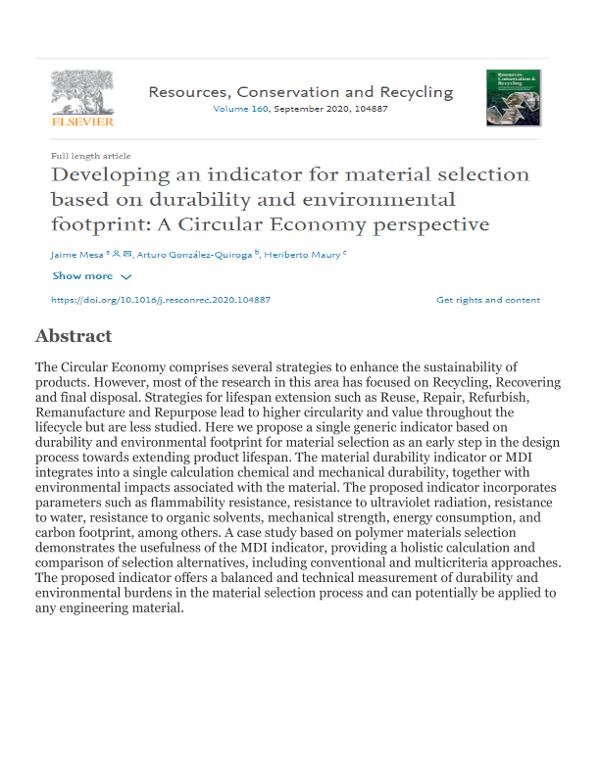Mostrar el registro sencillo del ítem
Developing an indicator for material selection based on durability and environmental footprint: A Circular Economy perspective
| dc.contributor.author | Mesa, Jaime | |
| dc.contributor.other | González-Quiroga, Arturo | |
| dc.contributor.other | Maury, Heriberto | |
| dc.date.accessioned | 2020-10-30T14:55:13Z | |
| dc.date.available | 2020-10-30T14:55:13Z | |
| dc.date.issued | 2020-05-19 | |
| dc.date.submitted | 2020-10-28 | |
| dc.identifier.citation | Mesa, J., González-Quiroga, A. and Maury, H., 2020. Developing an indicator for material selection based on durability and environmental footprint: A Circular Economy perspective. Resources, Conservation and Recycling, 160, p.104887. | spa |
| dc.identifier.issn | 0921-3449 | |
| dc.identifier.uri | https://hdl.handle.net/20.500.12585/9505 | |
| dc.description.abstract | The Circular Economy comprises several strategies to enhance the sustainability of products. However, most of the research in this area has focused on Recycling, Recovering and final disposal. Strategies for lifespan extension such as Reuse, Repair, Refurbish, Remanufacture and Repurpose lead to higher circularity and value throughout the lifecycle but are less studied. Here we propose a single generic indicator based on durability and environmental footprint for material selection as an early step in the design process towards extending product lifespan. The material durability indicator or MDI integrates into a single calculation chemical and mechanical durability, together with environmental impacts associated with the material. The proposed indicator incorporates parameters such as flammability resistance, resistance to ultraviolet radiation, resistance to water, resistance to organic solvents, mechanical strength, energy consumption, and carbon footprint, among others. A case study based on polymer materials selection demonstrates the usefulness of the MDI indicator, providing a holistic calculation and comparison of selection alternatives, including conventional and multicriteria approaches. The proposed indicator offers a balanced and technical measurement of durability and environmental burdens in the material selection process and can potentially be applied to any engineering material. | spa |
| dc.format.mimetype | application/pdf | spa |
| dc.language.iso | eng | spa |
| dc.source | Resources, Conservation and Recycling; vol. 160 (2020) | spa |
| dc.title | Developing an indicator for material selection based on durability and environmental footprint: A Circular Economy perspective | spa |
| datacite.rights | http://purl.org/coar/access_right/c_14cb | spa |
| oaire.version | http://purl.org/coar/version/c_970fb48d4fbd8a85 | spa |
| dc.identifier.url | https://www.sciencedirect.com/science/article/abs/pii/S0921344920302056 | |
| dc.type.driver | info:eu-repo/semantics/article | spa |
| dc.type.hasversion | info:eu-repo/semantics/publishedVersion | spa |
| dc.identifier.doi | 10.1016/j.resconrec.2020.104887 | |
| dc.subject.keywords | Material durability | spa |
| dc.subject.keywords | Product design | spa |
| dc.subject.keywords | Sustainability | spa |
| dc.subject.keywords | Decision making | spa |
| dc.subject.keywords | Circular economy | spa |
| dc.subject.keywords | Ecodesign | spa |
| dc.rights.accessrights | info:eu-repo/semantics/closedAccess | spa |
| dc.identifier.instname | Universidad Tecnológica de Bolívar | spa |
| dc.identifier.reponame | Repositorio Universidad Tecnológica de Bolívar | spa |
| dc.publisher.place | Cartagena de Indias | spa |
| dc.type.spa | Artículo | spa |
| dc.audience | Público general | spa |
| dc.publisher.sede | Campus Tecnológico | spa |
| oaire.resourcetype | http://purl.org/coar/resource_type/c_2df8fbb1 | spa |
| dc.publisher.discipline | Ingeniería Mecánica | spa |
Ficheros en el ítem
Este ítem aparece en la(s) siguiente(s) colección(ones)
-
Productos de investigación [1453]
Universidad Tecnológica de Bolívar - 2017 Institución de Educación Superior sujeta a inspección y vigilancia por el Ministerio de Educación Nacional. Resolución No 961 del 26 de octubre de 1970 a través de la cual la Gobernación de Bolívar otorga la Personería Jurídica a la Universidad Tecnológica de Bolívar.












